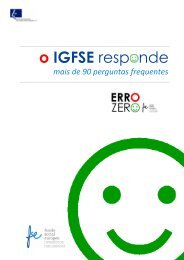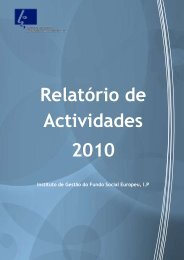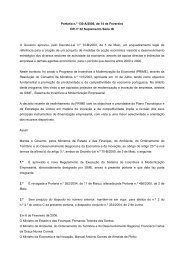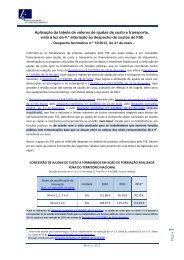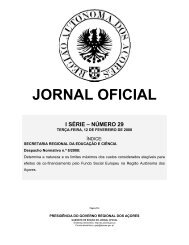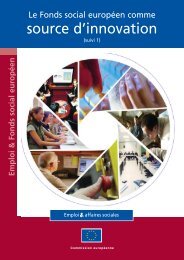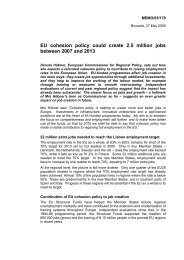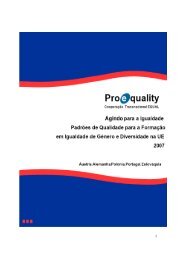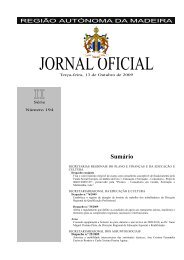Industrial Relations in Europe 2012 - European Commission - Europa
Industrial Relations in Europe 2012 - European Commission - Europa
Industrial Relations in Europe 2012 - European Commission - Europa
Create successful ePaper yourself
Turn your PDF publications into a flip-book with our unique Google optimized e-Paper software.
Change Summit <strong>in</strong> Cancun <strong>in</strong> December 2010, where the EU and other governments recognised the<br />
importance of ensur<strong>in</strong>g a just transition, decent work and quality jobs. The social partners also<br />
commented on a public consultation on the external dimension of EU energy policy. In a jo<strong>in</strong>t<br />
position, they stated that the <strong>Europe</strong>an <strong>Commission</strong> should recognise the dialogue between the<br />
social partners as a valuable contribution <strong>in</strong> <strong>Europe</strong> and <strong>in</strong> neighbour<strong>in</strong>g countries to shap<strong>in</strong>g the<br />
external dimension of EU energy policy and energy dialogue. Further, trade unions from several<br />
<strong>Europe</strong>an Member Sates conducted a project on the relationship between the quality of social<br />
dialogue and nuclear safety. Social dialogue <strong>in</strong> the nuclear energy sector is always closely l<strong>in</strong>ked to<br />
the state and characterised by the prom<strong>in</strong>ent role of employee representations. This project stressed<br />
the role of ma<strong>in</strong>ta<strong>in</strong><strong>in</strong>g a vibrant social dialogue <strong>in</strong> times of restructur<strong>in</strong>g, the end of former<br />
monopolies and <strong>in</strong>creased reliance on subcontract<strong>in</strong>g.<br />
S<strong>in</strong>ce 2008, the social dialogue committee for the live performance sector has been discuss<strong>in</strong>g the<br />
impact of the crisis on this sector. The economic slowdown has placed the susta<strong>in</strong>ability of this<br />
sector under pressure due to the consequences of austerity for public f<strong>in</strong>ances. In May 2009, the<br />
social partners adopted a jo<strong>in</strong>t statement, express<strong>in</strong>g their concerns and call<strong>in</strong>g for susta<strong>in</strong>ed public<br />
fund<strong>in</strong>g support for the perform<strong>in</strong>g arts. In January 2011, the social partners sent a jo<strong>in</strong>t letter to the<br />
Dutch authorities, convey<strong>in</strong>g their concerns about what they considered to be alarm<strong>in</strong>g plans for the<br />
future fund<strong>in</strong>g of the perform<strong>in</strong>g arts <strong>in</strong> the Netherlands, urg<strong>in</strong>g the Dutch government to reconsider<br />
its <strong>in</strong>tentions. In December <strong>2012</strong>, the social partners of the live performance committee were among<br />
the signatories of an open letter of the International Cultural Industry Associations to the Spanish<br />
Prime M<strong>in</strong>ister Mariano Rajoy, as well as the <strong>Europe</strong>an Parliament and the <strong>Commission</strong>, protest<strong>in</strong>g<br />
aga<strong>in</strong>st the Spanish government's <strong>in</strong>tentions to abolish the reduced VAT rate applicable to<br />
admissions to cultural activities such as c<strong>in</strong>ema, live music events and theatre. The organisations<br />
concerned claim that this will lead to a reduction of <strong>in</strong>vestments <strong>in</strong> the entire Spanish cultural sector<br />
and will destroy thousands of jobs.<br />
Employment, <strong>in</strong>dustrial policy and competitiveness<br />
Aga<strong>in</strong>st a background of cont<strong>in</strong>u<strong>in</strong>g economic uncerta<strong>in</strong>ty <strong>in</strong> many parts of the EU, the related<br />
topics of <strong>in</strong>dustrial policy, the competitiveness of economic sectors, the employability of the<br />
workforce and the challenge of demographic change have cont<strong>in</strong>ued to receive special attention <strong>in</strong><br />
social dialogue.<br />
An agreement on competence profiles for process operators and first l<strong>in</strong>e supervisors <strong>in</strong> the<br />
chemical <strong>in</strong>dustry was signed by the social partners <strong>in</strong> this sector – ECEG and EMCEF – on 15<br />
April 2011. This framework of action was the outcome of a project managed jo<strong>in</strong>tly by the two<br />
social partners, and <strong>in</strong>cludes the def<strong>in</strong>ition of m<strong>in</strong>imum core competences for the two job profiles<br />
and a commitment by their national member organisations to report annually on all implementation<br />
actions. On 20 March <strong>2012</strong>, ECEG and EMCEF also adopted a jo<strong>in</strong>t op<strong>in</strong>ion on the proposal for a<br />
Directive on energy efficiency, with the aim of ensur<strong>in</strong>g the global competitiveness of the <strong>Europe</strong>an<br />
chemical <strong>in</strong>dustry.<br />
In the civil aviation social dialogue committee, three of the recognised social partners, represent<strong>in</strong>g<br />
airports, <strong>in</strong>dependent ground handlers and workers (ACI-<strong>Europe</strong>, the International Aviation<br />
Handlers' Association (IAHA) and the <strong>Europe</strong>an Transport Workers’ Federation, ETF), adopted a<br />
276



